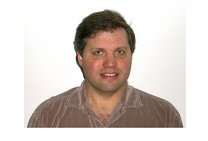Oral history interview with Douglas R. Kellogg
- 2005-Jan-13
- 2005-Jan-17
Douglas R. Kellogg grew up in St. Paul, Minnesota, the second oldest of four children. He had an early interest in reading, and took classes with several influential teachers. Kellogg first chose the University of Minnesota for his undergraduate studies, but after a summer job in Alaska, he transferred to University of Wisconsin, Madison. He always had an interest in and affinity for biology; between undergraduate and graduate school, Kellogg worked as a lab technician on Drosophila genetics, influencing the path of his future research interests and studies. There was no doubt in his mind that he would become a biologist. Kellogg chose to attend the University of California, San Francisco to pursue his graduate degree, working in Bruce M. Alberts's laboratory studying pattern formation in Drosophila embryo cytoskeleton. After completing his doctoral degree, he decided to stay in San Francisco for a postdoctoral position with Andrew W. Murray and researched the role of mitotic cyclin in coordination of cell growth and cell division. After his postdoc, Kellogg took a position at the University of California, Santa Cruz, where his research has focused on cell-signaling biochemistry in the coordination, division, and regulation of cell growth. In the interview, he spoke at length about the makeup of his lab and how he manages and teaches in the lab. Kellogg also reflects upon the role of technology, critical inquiry, competition, collaboration and creativity in his research and in his science in general. The interview concludes with a discussion of the role of the scientist in educating the public about science, and how this factors in to setting his own and the national scientific agenda; he also offers advice for beginning scientists, and reflects on his favorite scientific papers.
Access this interview
By request 1 PDF Transcript File and 6 Audio Recording Files
Fill out a brief form to receive immediate access to these files.
If you have any questions about transcripts, recordings, or usage permissions, contact the Center for Oral History at oralhistory@sciencehistory.org.









